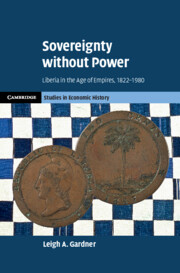Book contents
- Sovereignty without Power
- Cambridge Studies in Economic History
- Sovereignty without Power
- Copyright page
- Dedication
- Contents
- Figures
- Maps
- Tables
- Preface
- Acknowledgments
- 1 Reconstructing the Fragments
- Part I Foundations
- Part II The Art of Survival
- Part III Sovereignty for Sale?
- 8 An African Marshall Plan
- 9 Concessions and Growth
- 10 Selling the Flag
- 11 Sovereignty beyond the Age of Empires
- Book part
- References
- Index
11 - Sovereignty beyond the Age of Empires
from Part III - Sovereignty for Sale?
Published online by Cambridge University Press: 27 October 2022
- Sovereignty without Power
- Cambridge Studies in Economic History
- Sovereignty without Power
- Copyright page
- Dedication
- Contents
- Figures
- Maps
- Tables
- Preface
- Acknowledgments
- 1 Reconstructing the Fragments
- Part I Foundations
- Part II The Art of Survival
- Part III Sovereignty for Sale?
- 8 An African Marshall Plan
- 9 Concessions and Growth
- 10 Selling the Flag
- 11 Sovereignty beyond the Age of Empires
- Book part
- References
- Index
Summary
This concluding chapter begins with comparisons between Liberia and Ghana made on the occasion of Ghana’s independence in 1957. It then uses Liberia’s economic history to reassess conclusions about the impact of formal and informal colonialism on economic development, and draws out lessons from Liberia’s history for our understanding of postindependence developments in the rest of Africa.
- Type
- Chapter
- Information
- Sovereignty without PowerLiberia in the Age of Empires, 1822–1980, pp. 271 - 282Publisher: Cambridge University PressPrint publication year: 2022

